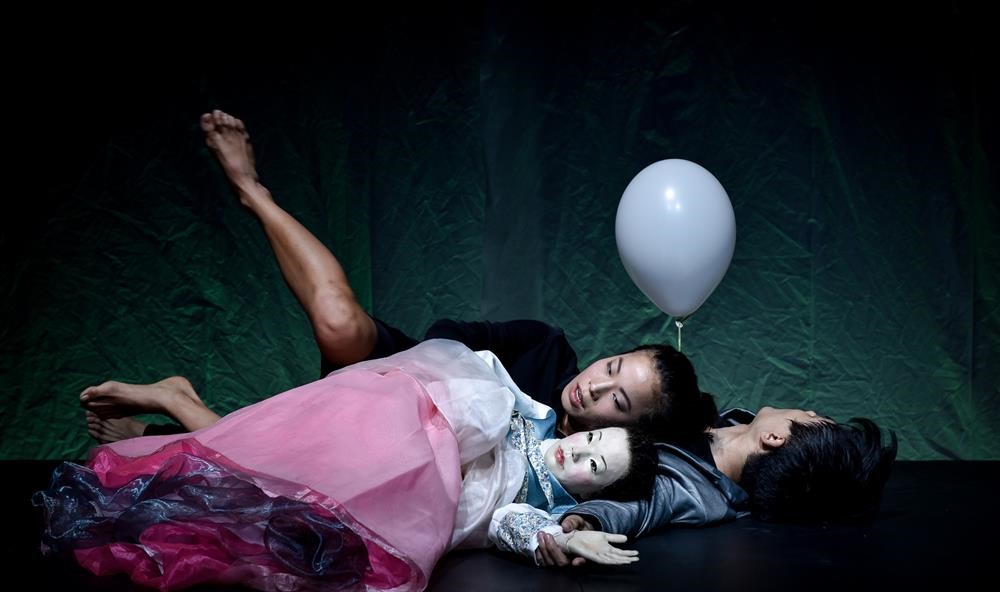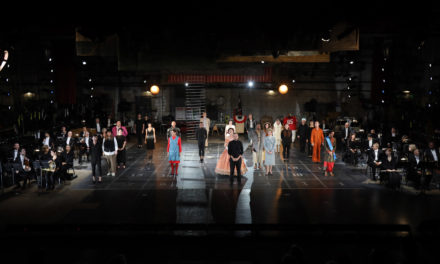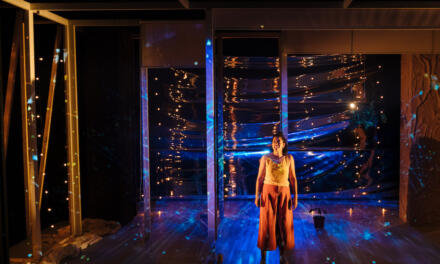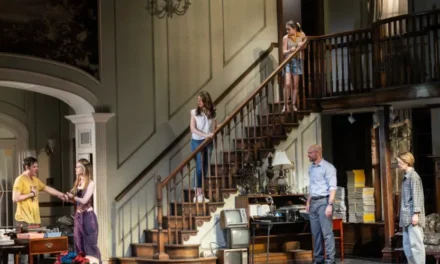Walls–Iphigenia in Exile, the result of a four-year collaboration between South Korean and German theatre artists, had its world premiere at the Asia Culture Center Theater in Gwangju, followed by the first of multiple planned performances at the Deutsches Theater in Berlin as part of their 2016-2017 season.
The project began as an arts exchange program in September 2013 co-hosted by the Korea Arts Management Service and the Goethe-Institut Korea. Five Korean artists—Jungung Yang (director), ZinA Choi (director), Kon Yi (director), Kyungsung Lee (director), and Danbi Yi (dramaturg)—traveled to Germany for a preliminary meeting with Ulrich Beck (dramaturg), Tilmann Köhler (director), Mario Salazar (playwright), Karoly Risz (designer), and Helmut Mooshammer (actor). As discussions evolved into workshop performances in later years with a final production on the horizon, other artists joined the project, including Korean actors Dakyung Yoon, HyunJun Ji, Kotti Yun (who is based in Berlin), and German actor Sabine Waibel.
The program was originally planned as a three-year process: the Korean-German creative team would share ideas, experiences, and historical backgrounds the first year, begin developing and workshopping a new piece in the second, and present the final product in both countries in the third. During the first-year residency in Berlin, the artists visited the Wall Museum and latched onto the wall as a common theme that could encompass Korea and Germany’s similar histories of national division. The image also resonated with ongoing issues of social alienation and ideological partisanship. Kon Yi, one of the Korean directors involved in the project, recalls:
“We wondered what the two nations had in common and immediately thought of the experience of a divided country. Germany went through division and reunification, while Korea is still divided. But we asked ourselves whether the ‘border’ was too narrow an idea for our work. In the end, we decided on the ‘wall’ as our theme in order to allow for a broader perspective. The Berlin Wall has fallen. But there are still other walls that divide East and West Germans. There are many walls among different classes, cultures, and races in a single nation. The walls that divide our societies—that became the starting point of our conversations.”
The artists experimented with different theatrical forms to explore this idea. Rather than collaborate on a single, coherent work, they settled on an omnibus structure of discrete short pieces in order to preserve the unique style and sensibility of each artist. Although the serial format made its way into the final production, the team also spent a month-long residency workshop in 2015 using Goethe’s Iphigenie auf Tauris as a source text that could serve as an anchor for the various stories and perspectives. The hyphenated title, Walls–Iphigenia in Exile, embodies this open and organic creative process, like a wall in which the irregular masonry and repaired spots are left visible rather than painted over in a uniform color.
The final production consists of five short pieces that translate Goethe’s idealized character into contemporary migrants and refugees, including a defector from North Korea, a Vietnamese bride, holograms in a historical museum, and a David Bowie fan.
Arrival, written and directed by Choi, tells the story of a Korean woman who defected to North Korea then back to South Korea, only to end up applying for asylum in Germany to escape the Korean peninsula altogether. However, she must keep her life in South Korea secret in order to be accepted as a North Korean refugee. Mail-Order Bride, written and directed by Kon Yi, takes the form of an interview between a sociology professor and a young Vietnamese woman who has been matched with a Korean man by an international marriage firm. In both Arrival and Mail-Order Bride, Iphigenia emerges as a symbol of the overseas traveler seeking hope in a foreign land.
Salazar’s new play Iphi-genie, an excerpt of which was directed by Köhler, also imagines a modern analogue to Goethe’s protagonist. Here, Iphi-genie (the persistent hyphen makes its way into the character’s name itself) is a defector from North Korea, working as a prostitute in Seoul to send money back to her destitute family across the border. Yang creates an imagistic piece based on another segment of Salazar’s play. Holographic recordings of different East German women, all named Iphigenia, recount stories of how their lives changed after reunification as part of a fictional exhibit at the German Historical Museum in the year 2050. Life in post-Wall Germany is also featured in Lee and Waibel’s piece Sabine Waibel–Just for One Day, in which the German actor shares her memories of living in Berlin as well as her attachment to David Bowie’s song “Heroes.”
The experience of being in exile—whether one is a young maiden spirited away by the gods or a refugee fleeing a crisis—often involves waiting for long stretches of time, uncertain of what the future may bring. Walls–Iphigenia in Exile is a one-of-a-kind theatrical work that clearly benefitted from a lengthy and intensive creative process, incorporating new ideas and current events as it developed over four years. Ironically, though, it is also a well-timed piece, as the idea of the wall has grown more pressing this year with unsettling events such as the Brexit referendum and the American presidential election.
This post was written by the author in their personal capacity.The opinions expressed in this article are the author’s own and do not reflect the view of The Theatre Times, their staff or collaborators.
This post was written by Kee-Yoon Nahm.
The views expressed here belong to the author and do not necessarily reflect our views and opinions.



















